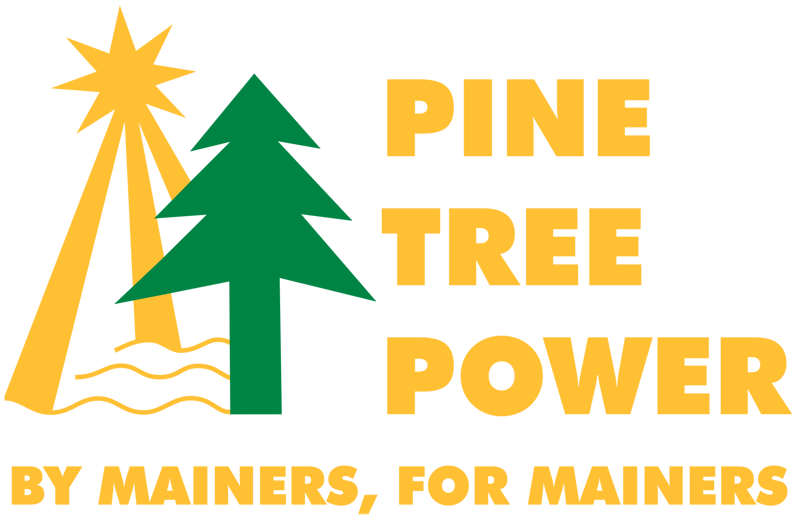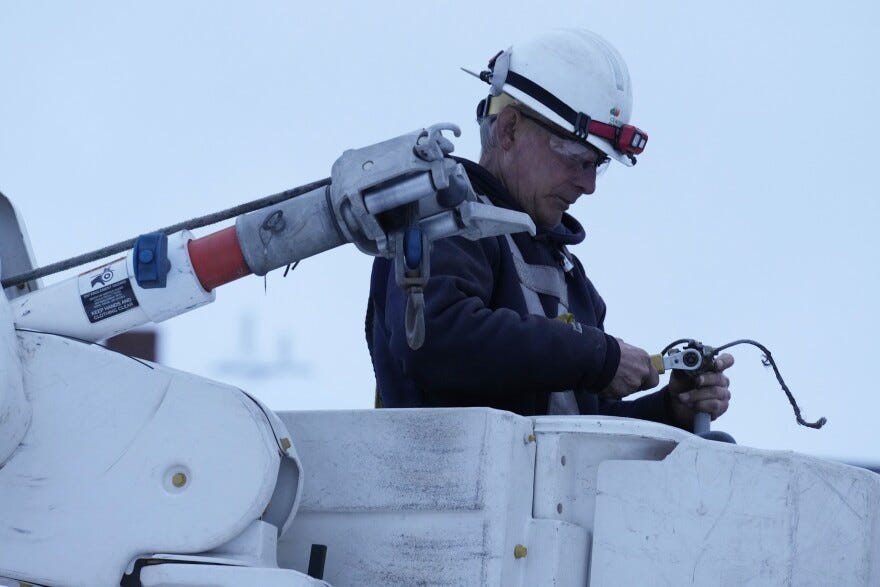Capitalism shouldn't mean that people are there for the exploiting
Electric power should be a human right, not a consumer good
Civilization, in fact, grows more maudlin and hysterical; especially under democracy it tends to degenerate into a mere combat of crazes; the whole aim of practical politics is to keep the populace alarmed (and hence clamorous to be led to safety) by an endless series of hobgoblins, most of them imaginary. Wars are no longer waged by the will of superior men, capable of judging dispassionately and intelligently the causes behind them and the effects flowing out of them. The are now begun by first throwing a mob into a panic; they are ended only when it has spent its ferine fury.
H.L. Mencken, In Defense of Women
We all pretty much take electricity for granted, right? And, honestly, we SHOULD be able to do that- turn on the light switch, and the light turns on. It’s pretty basic stuff. But there are too many places where electric power delivery has become so inefficient and overpriced that such a fundamental human right is a real hassle.
Take Maine, f’rinstance, where electricity is way overpriced, and the delivery is seriously inefficient. So much for getting more bang for your buck….
Backers of an initiative on November’s ballot in Maine have a wild, radical question: Why should something as basic and necessary for life as electric power be a for-profit business, instead of a public good like streets and schools and emergency services?
That’s a particularly significant question considering the demonstrable failings of Maine’s two big private electric utilities, Central Maine Power (CMP) and Versant Power, which consistently come in close to dead last in customer satisfaction surveys. Mainers pay some of the highest electric rates in the country, and have had to put up with more and longer power outages than any other Americans. As for renewable energy, getting rooftop solar connected to the grid is more expensive and a bigger logistical hassle than in most states, too.
Oh yes, and in June, Maine’s Public Utilities Commission approved a rate increase for CMP — in a month when 10 percent of CMP customers received disconnect notices because they couldn’t pay their electric bills. The kilowatts are too damn high.
So, poor customer service? Check. High rates? Check. More frequent and prolonged power outages than other parts of the country? Check. Hassles getting rooftop solar power connected to the grid? Check. Oh, and a rate increase for poor service, longer outages, and already high rates?
Check, check, AND check.
So what does one do when your electric utility sucks donkey balls, and you’re mad as Hell and don’t want to take it anymore? You don’t have to be Paddy Chayefsky to understand that sometimes you must go to the people and try to change the system. An initiative on November’s ballot would’ve done just that.
The private utilities are making good money — $187 million in profits last year — but those profits aren’t sloshing around Maine. Both utilities are owned by non-US corporations. Versant’s corporate ownership is in Canada, and CMP belongs to a subsidiary of a Spanish multinational.
So hey, Question 3 advocates argue, wouldn’t it be better to replace both with a public nonprofit (to be named Pine Tree Power) that would be managed by a publicly elected board? Make the utility answerable to Maine ratepayers, not to shareholders “from away,” as Mainers say.
So why, some Mainers are asking, are the private utilities taking $187 million out of Maine when they provide such poor service at such high rates?
What if Mainers were to turn electricity generation into a non-profit that would be answerable to a publicly-elected board instead of out-of-state shareholders?
What may have seemed like a good idea to some was voted down on Tuesday as Mainers voted to maintain the status quo instead of facing a future that almost certainly would’ve included a steady parade of lawsuits. Entrenched corporate interests don’t take kindly to losing their investments.
Supporters said there was little to lose because of the utilities’ poor performance. Critics said there’s no guarantee the nonprofit utility would perform any better, while the move could spark lawsuits and buying out the existing utilities could cost billions — as much as $13.5 billion.
Willy Ritch, executive director of the Maine Affordable Energy Coalition, which opposed the takeover, said Maine voters “rejected billions of dollars in debt and they rejected the risk and uncertainty that came with it.”
The vote came amid intense criticism of Central Maine Power over its slow response to storm-related power outages, a botched billing system rollout and perceived roadblocks to connecting renewable power projects to the grid, among other things.
“Our grassroots campaign has talked with thousands of Mainers — it is clear that CMP and Versant are hurting people,” said Al Cleveland, Pine Tree Power's campaign manager, who also said the drive for a consumer-owned utility would continue.
The idea behind Pine Tree Power as a consumer-owned and -driven utility was a unique approach. Ultimately, though, voters were reluctant to leap into the unknown, even with all the problems they’ve experienced with Central Maine Power and Versant Power.
Taking the profit motive out of providing electricity could save Maine households $367 a year, according to Maine state Sen. Nicole Grohoski in an interview with the invaluable Volts podcast. Grohoski likened a public takeover of the utilities to buying a house and paying less for your mortgage than renting and sending your money to a landlord.
As a nonprofit, Pine Tree Power would be able to “access low-cost capital through revenue bonding at 3-5 percent” (compared to the 10 to 12 percent returns private companies require) in order to make big investments in grid upgrades needed for the transition to clean power. To meet climate goals, Mainers will will need to replace their oil furnaces with heat pumps (swaps that federal funding will help with, thank you Joe Biden), and of course there’ll be all those EVs to charge.
So, they would’ve paid less, received better service, and the money generated would’ve stayed in Maine? Plus, as a non-profit, Pine Tree Power could access capital at better rates to invest in grid upgrades. The concept was appealing, even if the execution was the unknown in the equation.
Mainers, however, appeared somewhat less sanguine about leaping into that unknown.
Sure, Mainers would’ve needed to make some changes (like ditching their oil furnaces, as mentioned above), but part of the goal of Pine Tree Power would’ve been to positively impact global climate change.
Neither of the private utilities, by the way, owns any generating stations; rather, they own the power lines and buy electricity on the open market and deliver it to customers. The initiative would bar Pine Tree Power from owning any generation capacity, but would allow it to own battery storage to keep the grid powered. And while the initiative doesn’t mandate that the board purchase more power from renewable sources, Grohoski points out that the nonprofit model would eliminate a perverse incentive that leads private utilities to resist rooftop solar or even operating more efficiently, neither of which creates revenue in our current system:
“[Private] utilities make more money when they build transmission lines than when they upgrade the distribution system. They get a higher rate of return, right? So it is in their best interest to continue with the model of large far-off generation facilities compared to local rooftop solar type solutions or microgrids or battery storage.”
In Maine, as in many other states, there’s a perverse incentive for utilities to discourage the installation of solar power equipment. Versant, which operates in eastern and northern Maine, is known for requiring steps that, from an engineering standpoint, make no sense and can’t be explained.
All their arbitrary requirements do is create delays and drive up installation costs.
“These guys are some of the worst actors we've ever seen in the United States. They are requiring things that they can't justify why they're requiring them, and we can find no reason from an engineering perspective to require them. […] For Versant customers, the average cost of interconnecting your rooftop solar to the grid is $10,000.”
And, as might be imagined, that battle to defeat Question 3 was…well, somewhat shady:
Not surprisingly, the utilities are going all out to spread as much fear and uncertainty as they can about the initiative, spending upwards of $27 million to defeat Question 3, complete with funding an astroturf group called “Maine Affordable Energy” to explain why local control would be a bad thing. As Bill McKibben notes in The Nation, that’s led to some fun absurdities like the executive director of Maine Affordable Energy, Willy Rich, saying that
he didn’t think Mainers wanted “out-of-state politicians” telling them what to do; reporters pointed out that his group had taken $18 million in out-of-state money to oppose the referendum.
Plus there’s that thing where the two utilities are already owned by out-of-state US branches of foreign countries, as if irony were still a thing.
The generation and delivery of electricity is one of those things in life that few of us think about. It’s easy to take for granted- you flip a switch, a light comes on- just the most natural thing in the world, right?
But getting that electricity into your home or apartment is a multi-billion dollar business that’s tightly regulated and controlled in most states. And yet even with all the government oversight, customer service and product delivery still sucks in too many states.
The combination of an old, inefficient, and seriously outdated grid and utilities too often disincentivized from making necessary upgrades can cost customers significant amounts of money. Things like utilities dragging their feet or requiring unnecessary steps before allowing the installation of solar power equipment and hooking it up to the grid can add thousands of dollars in costs for end users.
Mainers had the opportunity to make electric power a public utility controlled by the people of Maine and not a private service controlled by foreign companies as they are now. This would’ve kept money in Maine and made the system more manageable and efficient, which would’ve kept costs down and improved customer service.
Change can be hard to contemplate, especially when it means leaping into a future with many questions- many planted by Central Maine Power and Versant. Sometimes, it’s easier to stick with the Devil you know than to step off into the Great Unknown.
(All of my posts are now public. Any reader financial support will be considered pledges- support that’s greatly appreciated but not required to get to all of my work. I’ll trust my readers to determine if my work is worthy of their financial support and at what level. To those who do offer their support, thank you. It means more than you know.)








Some years ago, before FB and Twitter swallowed the internet, I was following a discussion group where it was pointed out that rationalizing the power delivery grid in the US was the single most important step toward making renewables a viable alternative to fossil fuels. Solar power from AZ could easily find its way to homes in Maine. But rationalizing the grid basically means nationalizing it.